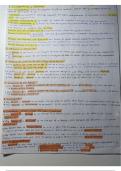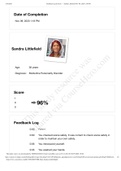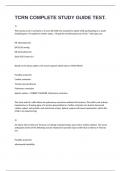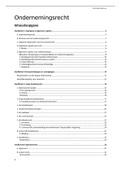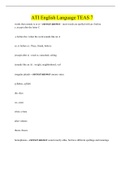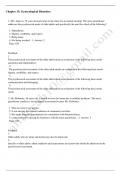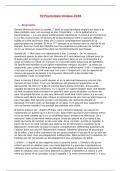FINANCAL STATEMENT ANALYSE
LES 1:
1. Introduction
Purpose of financial statements analysis:
- Is to screen the financial state of a company.
- Based on the obtained information predictions can be made of the future financial
situation
Financial statements analysis is a technique to provide information to several stakeholders
(manager, leveranciers, aandeelhouders, …)
The analysis can be based on:
- Internal information
- External information (the annual accounts)
The annual accounts:
- Is the most important information source about a company’s assets and liabilities,
result and financial position, consists of:
• The balance sheet (BS)
• The profit and loss account (P&L)
• The notes to the accounts
▪ The social balance sheets.
1.1 Generally accepted accounting principles (GAAP)
The annual accounts have to be uniform and reliable.
Belgian legislation and regulations: (geen examenstof)
- Tax code of companies (7 May 1999)
• The code of company’s and associations (23 March 2019)
- The law on the accounts of companies (17 July 1975) and its decree implementing the
law.
• The economic law code (28 February 2013)
- Opinions and recommendations of the CBN (commission for accounting standards)
- The international financial reporting standards
The local GAAP can be categorized as following:
- Basic assumptions
• Business entity principle
• Going concern
• Consistency
• Monetary unit principle
- How to record transactions
• Documentation
1
, • Completeness
• Non-compensation
• Matching concept
- Valuation
• Individual valuation
• Prudence
• Objectivity
• Relevance (materiality)
- Reporting
• Time-period principle
• Comparability
• Faithful representation
1.2 Basic assumptions
1.2.1 Business entity
An enterprise has its own identity and existence distinct from its owners → a person.
The balgian law distinguished 4 types of enterprises based in their SIZE:
- Very small companies (small enterprises)
• Sole trades and companies whose members have unlimited liability.
• With an annual turnover of max 500.000 euro
- No double entry bookkeeping or annual accounts
Annual average workforce: 50
Annual turnover: 9.000.000 euro
Balance sheet total: 4.500.000 euro
- Small companies
= they may not exceed more than one of the following ceilings:
• UNLESS the company is part of a group of companies that exceed the previous
ceilings on a consolidated basis.
- Micro companies
- = they may not exceed more than one of the following ceilings:
Annual average workforce: 10 FTE
Annual turnover: 700.000 euro
Balance sheet total: 350.000 euro
• Micro companies
▪ Have a double entry bookkeeping and prepare annual accounts using
the micro format.
2
, • Small companies
▪ Have a double entry bookkeeping and prepare annual accounts using
the abbreviated format.
• Large companies
▪ Have a double entry bookkeeping and prepare annual accounts using
the full/ complete format.
Associations and foundations:
- Size of the association determines which format needs to be filed.
• Full format when considered as large- double entry bookkeeping.
• Abbreviated format when considered as small – double entry bookkeeping.
• Micro format when considered as “very” small/micro – simplified entry
bookkeeping.
- Criteria: large-small-micro:
• Annual average workforce
• Annual turnover
• Balance sheet total
- Large when more than one of the following thresholds are exceed:
Annual average workforce: 50
Annual turnover: 9.000.000 euro
Balance sheet total: 4.500.000 euro
- Small when none or one of the following thresholds are reached of exceed:
Annual average workforce: 50
Annual turnover: 9.000.000 euro
Balance sheet total: 4.500.000 euro
- Micro when none or one of the following thresholds are reached or exceed:
Annual average workforce: 10 FTE
Annual turnover: 700.000 euro
Balance sheet total: 350.000 euro
1.2.2 Going concern.
A business will be in operation for the foreseeable future.
3
, 1.2.3 Consistency
The accounting policy that a company uses should be consistent.
- Comparability
- The methods of measurement:
• The notes of the accounts
• Section C
1.2.4 Monetary unit
Transactions are recorded (if possible) in monetary terms.
For the BE GAAP → euro
1.3 Reporting principles
1.3.1 Time-period principle
Once a year the annual accounts have to be made public by filing them with the Central
Balance Sheet Office
Company year = accounting year = financial year
- Accounting year calendar year
- Accounting year normally consists of 12 months.
• An accounting year with more or less than 12 months
→ the income statements must be converted: CONSISTENCY.
1.3.2 Comparability
The annual accounts have to be comparable from year to year, but also in relation to other
companies.
Same economic branch
- To evaluate the profitability of a company
International Accounting Standards: IAS
International Financial Reporting Standards: IFRS
NBB: sector information (NACE-code)
1.3.3 Faithful representation
The financial statements should offer a true and fair view of a company.
Annual accounts in Belgium are used for tax purposes.
1.4 Measurement
If you want to analyses, you must have a fair knowledge of the measurement bases that
were used
4
LES 1:
1. Introduction
Purpose of financial statements analysis:
- Is to screen the financial state of a company.
- Based on the obtained information predictions can be made of the future financial
situation
Financial statements analysis is a technique to provide information to several stakeholders
(manager, leveranciers, aandeelhouders, …)
The analysis can be based on:
- Internal information
- External information (the annual accounts)
The annual accounts:
- Is the most important information source about a company’s assets and liabilities,
result and financial position, consists of:
• The balance sheet (BS)
• The profit and loss account (P&L)
• The notes to the accounts
▪ The social balance sheets.
1.1 Generally accepted accounting principles (GAAP)
The annual accounts have to be uniform and reliable.
Belgian legislation and regulations: (geen examenstof)
- Tax code of companies (7 May 1999)
• The code of company’s and associations (23 March 2019)
- The law on the accounts of companies (17 July 1975) and its decree implementing the
law.
• The economic law code (28 February 2013)
- Opinions and recommendations of the CBN (commission for accounting standards)
- The international financial reporting standards
The local GAAP can be categorized as following:
- Basic assumptions
• Business entity principle
• Going concern
• Consistency
• Monetary unit principle
- How to record transactions
• Documentation
1
, • Completeness
• Non-compensation
• Matching concept
- Valuation
• Individual valuation
• Prudence
• Objectivity
• Relevance (materiality)
- Reporting
• Time-period principle
• Comparability
• Faithful representation
1.2 Basic assumptions
1.2.1 Business entity
An enterprise has its own identity and existence distinct from its owners → a person.
The balgian law distinguished 4 types of enterprises based in their SIZE:
- Very small companies (small enterprises)
• Sole trades and companies whose members have unlimited liability.
• With an annual turnover of max 500.000 euro
- No double entry bookkeeping or annual accounts
Annual average workforce: 50
Annual turnover: 9.000.000 euro
Balance sheet total: 4.500.000 euro
- Small companies
= they may not exceed more than one of the following ceilings:
• UNLESS the company is part of a group of companies that exceed the previous
ceilings on a consolidated basis.
- Micro companies
- = they may not exceed more than one of the following ceilings:
Annual average workforce: 10 FTE
Annual turnover: 700.000 euro
Balance sheet total: 350.000 euro
• Micro companies
▪ Have a double entry bookkeeping and prepare annual accounts using
the micro format.
2
, • Small companies
▪ Have a double entry bookkeeping and prepare annual accounts using
the abbreviated format.
• Large companies
▪ Have a double entry bookkeeping and prepare annual accounts using
the full/ complete format.
Associations and foundations:
- Size of the association determines which format needs to be filed.
• Full format when considered as large- double entry bookkeeping.
• Abbreviated format when considered as small – double entry bookkeeping.
• Micro format when considered as “very” small/micro – simplified entry
bookkeeping.
- Criteria: large-small-micro:
• Annual average workforce
• Annual turnover
• Balance sheet total
- Large when more than one of the following thresholds are exceed:
Annual average workforce: 50
Annual turnover: 9.000.000 euro
Balance sheet total: 4.500.000 euro
- Small when none or one of the following thresholds are reached of exceed:
Annual average workforce: 50
Annual turnover: 9.000.000 euro
Balance sheet total: 4.500.000 euro
- Micro when none or one of the following thresholds are reached or exceed:
Annual average workforce: 10 FTE
Annual turnover: 700.000 euro
Balance sheet total: 350.000 euro
1.2.2 Going concern.
A business will be in operation for the foreseeable future.
3
, 1.2.3 Consistency
The accounting policy that a company uses should be consistent.
- Comparability
- The methods of measurement:
• The notes of the accounts
• Section C
1.2.4 Monetary unit
Transactions are recorded (if possible) in monetary terms.
For the BE GAAP → euro
1.3 Reporting principles
1.3.1 Time-period principle
Once a year the annual accounts have to be made public by filing them with the Central
Balance Sheet Office
Company year = accounting year = financial year
- Accounting year calendar year
- Accounting year normally consists of 12 months.
• An accounting year with more or less than 12 months
→ the income statements must be converted: CONSISTENCY.
1.3.2 Comparability
The annual accounts have to be comparable from year to year, but also in relation to other
companies.
Same economic branch
- To evaluate the profitability of a company
International Accounting Standards: IAS
International Financial Reporting Standards: IFRS
NBB: sector information (NACE-code)
1.3.3 Faithful representation
The financial statements should offer a true and fair view of a company.
Annual accounts in Belgium are used for tax purposes.
1.4 Measurement
If you want to analyses, you must have a fair knowledge of the measurement bases that
were used
4


